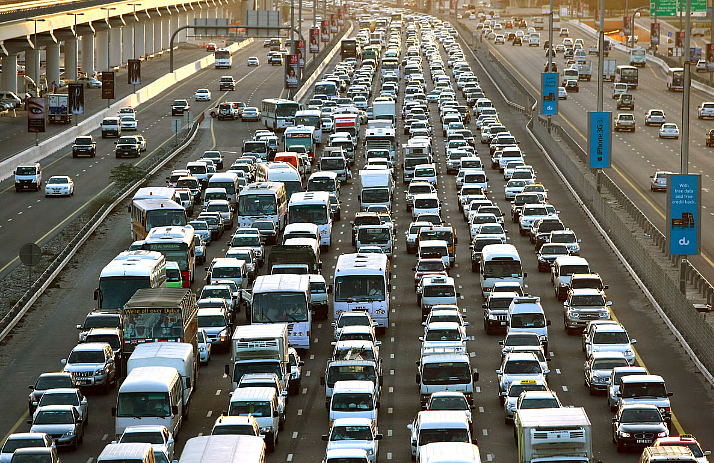
Dubai-Sharjah Traffic: 90% Of Drivers Face Daily Jams, Says New Study
Nearly 90 per cent – 9 out of 10 – motorists in Sharjah and Dubai said they typically experience traffic congestion, according to a new study.
Commissioned by Al Wathba National Insurance and released by RoadSafetyUAE, the study showed that 86 per cent of UAE respondents stated experiencing traffic congestion with the highest values in Dubai (91 per cent) and Sharjah (90 per cent).
Recommended For You Transit-driven growth: Blue Line and Etihad Rail reshape UAE's real estate marketAround 80 per cent of respondents in UAE said they witnessed more traffic congestion this year than last year, with Dubai topping the list with 85 per cent.
Stay up to date with the latest news. Follow KT on WhatsApp Channels.
Traffic in the UAE – especially Dubai, Sharjah and Abu Dhabi – has increased substantially over the past few years due to a big increase in population in the country.
According to worldometers data, the UAE population has grown from 9.448 million in 2020 to 11.345 million. Similarly, Dubai's population is reaching approximately 4 million , the highest ever. This influx of new residents has resulted in an increase in the number of vehicles on the roads.
In March 2025, the UAE's Federal National Council (FNC) member. Dr Adnan Al Hammadi also raised the issue of daily gridlock between Dubai and Sharjah, highlighting concerns over the psychological effects of traffic congestion UAE residents experience on a daily basis.
Muralikrishnan Raman, chief financial officer of Al Wathba Insurance, said“road traffic congestion is of big relevance to everyone in the UAE, on a daily basis.”
Thomas Edelmann, founder and managing director of RoadSafetyUAE, said the objective of the study is to“provide input to the concerned authorities and stakeholders to understand the public perception about traffic congestion, how they see the reasons for it and on which areas they would focus to improve the situation.”
Peak traffic times
UAE motorists stated that they experience the highest traffic congestion in the afternoon, followed by the morning work commute and the morning school drop-offs. The list gets completed by weekend activities, afternoon school pick-ups and errands.
Citing the reasons, the study found that the traffic congestion is dominated by too many vehicles on the road, all offices start at the same time, all schools start around the same time, and heavy dependency on private cars.
Poor driving behaviour, low vehicle occupancy, not enough working from home, road design, lack of public transportation and lack of infrastructure for alternative modes of transportation were the other reasons cited by motorists during the survey, which was conducted in June.
In order to deal with the growing traffic challenge, UAE residents suggested promoting working from home, improving public transportation, and expanding the road network and public bus services.

Legal Disclaimer:
MENAFN provides the
information “as is” without warranty of any kind. We do not accept
any responsibility or liability for the accuracy, content, images,
videos, licenses, completeness, legality, or reliability of the information
contained in this article. If you have any complaints or copyright
issues related to this article, kindly contact the provider above.


















Comments
No comment